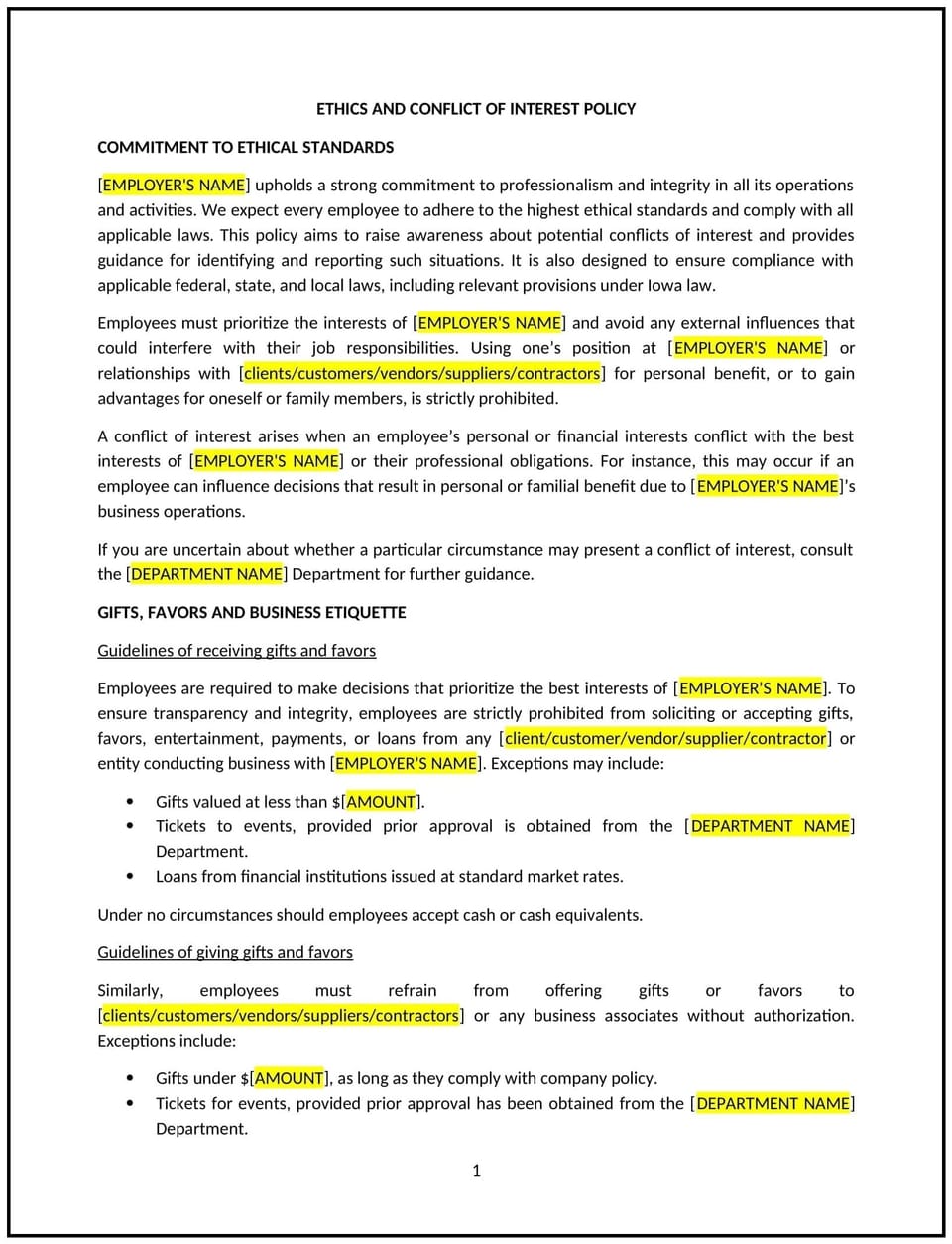Ethics and conflict of interest policy (Iowa): Free template

Ethics and conflict of interest policy (Iowa)
An ethics and conflict of interest policy helps Iowa businesses establish clear expectations for ethical decision-making and avoiding conflicts that could harm business integrity. Employees should act in the best interest of the business, avoiding situations where personal interests may interfere with professional responsibilities.
This policy outlines ethical conduct standards, defines conflicts of interest, and provides guidance on reporting and managing potential conflicts. It helps businesses promote transparency, accountability, and trust among employees, customers, and stakeholders.
By implementing this policy, businesses in Iowa can reduce ethical risks, strengthen company culture, and protect business reputation.
How to use this ethics and conflict of interest policy (Iowa)
- Define ethical expectations: Establish principles for honesty, fairness, and professional conduct in all business activities.
- Identify conflicts of interest: Clarify situations that could create conflicts, such as personal financial interests, gifts from vendors, or outside business relationships.
- Set disclosure requirements: Require employees to report any potential conflicts of interest to management or HR.
- Address gift and hospitality guidelines: Establish limits on accepting gifts, entertainment, or favors from clients, vendors, or business partners.
- Provide guidance on outside employment: Define when employees may engage in outside work or business ventures without conflicting with their job responsibilities.
- Establish reporting procedures: Create a process for employees to report ethical concerns or conflicts confidentially.
- Implement training programs: Educate employees on ethical decision-making and recognizing conflicts of interest.
- Review and update: Regularly assess ethics policies to reflect evolving business needs and industry standards.
Benefits of using this ethics and conflict of interest policy (Iowa)
This policy offers several advantages for Iowa businesses:
- Promotes ethical decision-making: Encourages employees to act with integrity and professionalism.
- Reduces conflicts of interest: Provides clear guidelines for identifying and managing potential conflicts.
- Strengthens company reputation: Builds trust with employees, clients, and business partners.
- Enhances workplace transparency: Encourages open communication about ethical concerns.
- Prevents legal and financial risks: Helps businesses address ethical issues before they escalate.
- Supports a culture of accountability: Reinforces the importance of ethical behavior across all levels of the organization.
Tips for using this ethics and conflict of interest policy (Iowa)
- Establish a reporting channel: Businesses should create a confidential system for employees to report ethical concerns or conflicts of interest.
- Train employees on ethical conduct: Businesses should provide regular training on recognizing and handling ethical dilemmas.
- Monitor conflicts of interest: Businesses should require employees to disclose potential conflicts annually or as they arise.
- Set clear gift acceptance limits: Businesses should define acceptable gift and hospitality thresholds to avoid potential influence.
- Encourage transparency: Businesses should foster open discussions about ethical concerns to prevent misunderstandings.
- Update policies as needed: Businesses should review ethics guidelines regularly to align with industry practices and business priorities.
Q: Why should Iowa businesses implement an ethics and conflict of interest policy?
A: Businesses should establish this policy to promote ethical behavior, reduce conflicts of interest, and protect company integrity.
Q: What is considered a conflict of interest?
A: Businesses should classify conflicts as any situation where personal, financial, or external interests interfere with business responsibilities.
Q: How should employees disclose potential conflicts?
A: Businesses should require employees to report conflicts in writing to HR or management as soon as they arise.
Q: Can employees accept gifts from clients or vendors?
A: Businesses should define acceptable gift limits and discourage accepting items that could influence decision-making.
Q: What should businesses do if an employee is involved in a conflict of interest?
A: Businesses should assess the situation, determine if mitigation is needed, and document resolution steps.
Q: How often should businesses review their ethics and conflict of interest policy?
A: Businesses should reassess the policy annually to address emerging ethical risks and workplace concerns.
Q: What role do managers play in enforcing ethics policies?
A: Businesses should expect managers to lead by example, address concerns, and ensure employees follow ethical guidelines.
Q: How should businesses handle anonymous ethics reports?
A: Businesses should establish a confidential reporting system and investigate all concerns fairly and objectively.
This article contains general legal information and does not contain legal advice. Cobrief is not a law firm or a substitute for an attorney or law firm. The law is complex and changes often. For legal advice, please ask a lawyer.


